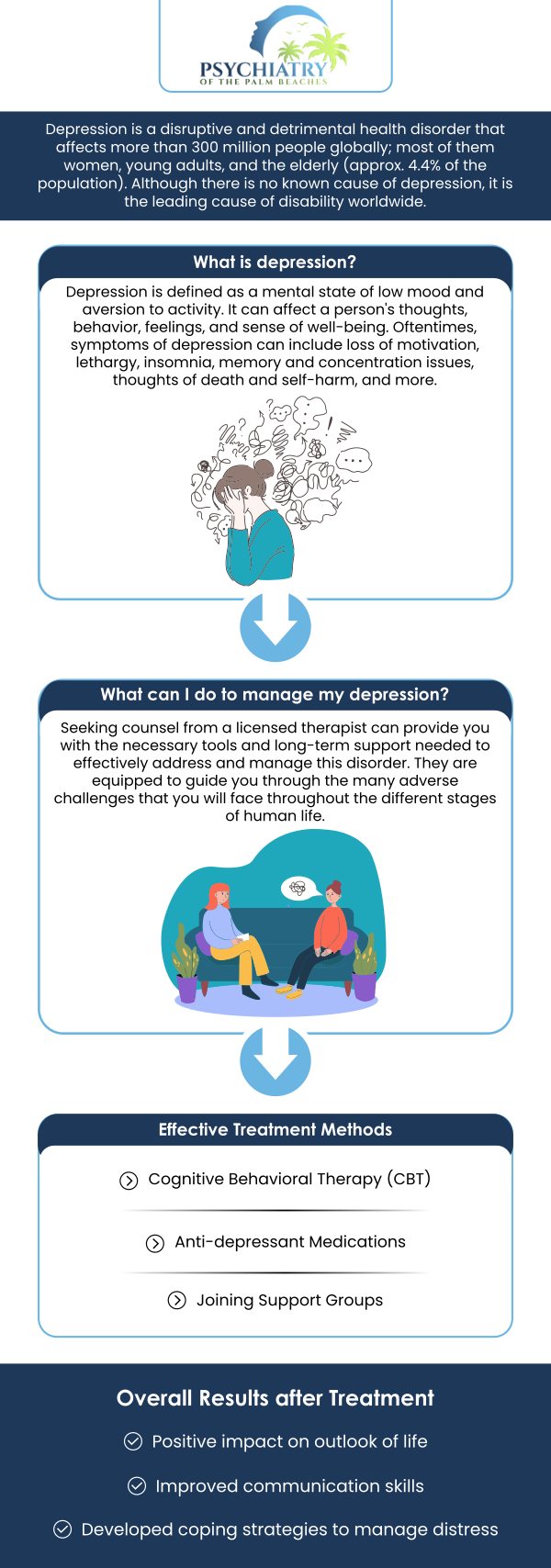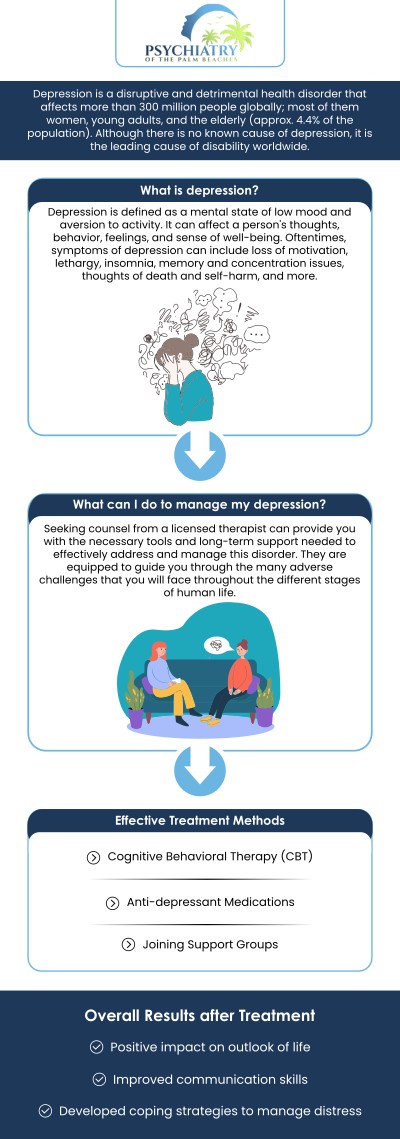Depression Treatment Specialist in Stuart, FL
Psychiatry of the Palm Beaches in Stuart, FL, provides professional options for effective depression treatment, including medication, therapy, and a combination of approaches. Our experienced therapists and psychiatrists provide a supportive environment for those navigating the challenges of depression, ensuring a successful recovery journey. For more information, contact us today or book an appointment online. We are conveniently located at 729 SW Federal Hwy Suite #104, Stuart, FL 34994.


Table of Contents:
What does depression look like?
How can loved ones best support someone suffering from depression?
What role do hormones play in triggering depressive episodes?
How can behavioral therapy help in treating depression?
Depression is not just a mood disorder; it’s a complex mental health disorder that presents itself through a variety of emotional, physical, and cognitive symptoms.
• Emotional Symptoms:
Depression often presents itself through persistent feelings of sadness, hopelessness, or emptiness. Individuals may also exhibit heightened frustration, irritability, or anxiety over seemingly minor matters. A prominent sign of depression is a loss of interest in previously liked activities, such as hobbies, social contacts, and even sex. The professionals at Psychiatry of the Palm Beaches have the expertise to treat severe depression symptoms such as feelings of worthlessness, guilt, social withdrawal, and even suicidal ideation or attempts.
• Physical Symptoms:
Depression can also manifest physically. Changes in diet resulting in significant weight loss or gain, sleep difficulties, decreased energy, or unexplained aches and pains are frequently related to depression. At Psychiatry of the Palm Beaches, we take a comprehensive approach to understanding your physical symptoms and how they relate to your mental health.
• Cognitive Symptoms:
Depression can cause cognitive changes, such as trouble thinking, concentrating, making decisions, and remembering things. Negative and distorted thoughts, slowed speech or movements, indecisiveness, procrastination, and memory loss or impaired attention are also indicative of depression.
Remember, symptoms must last at least two weeks for a diagnosis of depression. If you or someone you care about have symptoms of depression, it’s essential to reach out to Psychiatry of the Palm Beaches for help. We ensure that our patients understand that depression is a treatable condition and provide comprehensive care to help them reclaim their lives.
Depression is a challenging mental health condition that affects both those who suffer from it and those who care for them. Here at Psychiatry of the Palm Beaches, we understand that supporting a loved one with depression can sometimes be overwhelming, but it’s important to remember that your compassion and care can significantly contribute to their recovery process.
• Understanding Depression
As a caregiver or family member, learning about depression is essential. Remember that depression is a serious disorder that affects both physical and mental health. It’s not a mental state that can be easily overcome. Depression is a complex and curable disorder that can appear in a variety of ways, including chronic sorrow, loss of interest in activities, changes in sleep and food, problems focusing, and fatigue.
• Providing Emotional Support
Active listening is a significant aspect of support. Encourage your loved one to express their feelings freely without fear of judgment. Sometimes, they might not need solutions but just someone to empathize with and validate their experiences. By recognizing their difficulties, you can make them feel heard. It’s also essential to remind them of their value and respect their desire for personal space.
• Practical Assistance
Depression recovery is a process that requires patience. You can offer practical help like accompanying your loved one to therapy sessions or doctor’s appointments here at Psychiatry of the Palm Beaches. You can also assist with household tasks or promote healthy habits. Encourage them to seek professional treatment.
• Boundaries and Expectations
Set realistic expectations and always maintain a supportive tone. Avoid pressuring them into feeling better or giving advice that they did not ask for.
Psychiatry of the Palm Beaches is a medical practice that recognizes the significant role hormones play in the functioning of the body, including mood regulation. This understanding is crucial when diagnosing and treating mood disorders like depression.
Hormonal imbalances can play a complex role in triggering depressive episodes. For instance, excessive amounts of cortisol, a hormone generated by the adrenal glands in reaction to stress, can cause depression symptoms if the body produces too much over a long period. Chronic stress can elevate cortisol levels, impairing memory, concentration, and mood, which are factors we consider in our comprehensive approach to mental health.
Additionally, we understand how thyroid hormones affect mood control. Both hypothyroidism and hyperthyroidism can impair cognitive performance and cause depressive symptoms. Our experienced team is well-equipped to identify these issues and provide appropriate treatment options.
We also recognize the impact of sex hormones on mood, especially in women. Fluctuations in hormone levels during various points in the menstrual cycle, after childbirth, and during menopause can contribute to depressive episodes.
We believe that behavioral therapy plays a significant role in treating depression. This psychotherapeutic treatment targets the interconnected relationship between thoughts, emotions, and behaviors, and aims to modify maladaptive patterns that contribute to depression. We have found this effective psychological intervention to be beneficial in helping our patients understand how their thoughts and feelings influence their behaviors.
One of the primary ways that we use behavioral therapy to facilitate depression treatment is by helping our patients identify and challenge their negative behavioral patterns. Our therapists work collaboratively with patients to replace these negative behavioral patterns with more balanced, realistic, and positive alternatives.
Depression often results in withdrawal, avoidance, and reduced engagement in activities that once brought joy. Our therapists use behavioral therapy to address these maladaptive behaviors by encouraging patients to gradually face their fears and reengage in meaningful activities. We teach our patients how to unlearn the behavioral responses to depression by promoting positive behaviors that have been avoided due to depressive symptoms. This process empowers our patients to break the cycle of avoidance and isolation, leading to increased activity levels and a sense of accomplishment.
Our Team’s Supportive Approach to Treating Depression
Depression can make everyday tasks feel overwhelming, but our team at Psychiatry of the Palm Beaches provides supportive, personalized care that aims to restore clarity and emotional resilience. His treatment plans help patients rebuild confidence and emotional steadiness.
At Psychiatry of the Palm Beaches, we use effective therapies to treat particular issues associated with a diagnosed mental condition. We teach our patients coping methods and tools that allow them to take an active role in their mental health. The skills learned during behavioral therapy sessions can be useful even after the sessions have concluded, as patients can continue to apply these skills in various situations they encounter in life. This fosters self-awareness, self-management skills, and a sense of control, making individuals more resilient to future depressive episodes. For more information, contact us today or book an appointment online. We are conveniently located at 729 SW Federal Hwy Suite #104, Stuart, FL 34994. We serve patients from Stuart FL, Palm City FL, Port St. Lucie FL, River Park FL, White City FL, Port Salerno FL, and surrounding areas.
Check Out Our 5 Star Reviews



Additional Services You May Need
▸ Mental Wellness
▸ Relationship Coaching
▸ Depression and Mood Disorders
▸ Women’s Health
▸ Panic Disorder
▸ Medications Management
▸ Men’s Health
▸ Individual Psychotherapy
▸ Bipolar
▸ ADHD
▸ Geriatric Mental Health
▸ Couple’s Counseling
▸ Obsessive Compulsive Disorder
▸ Social Phobia Treatment
▸ Eating Disorders
▸ Post Traumatic Stress Disorder
▸ Psychotic Disorders



